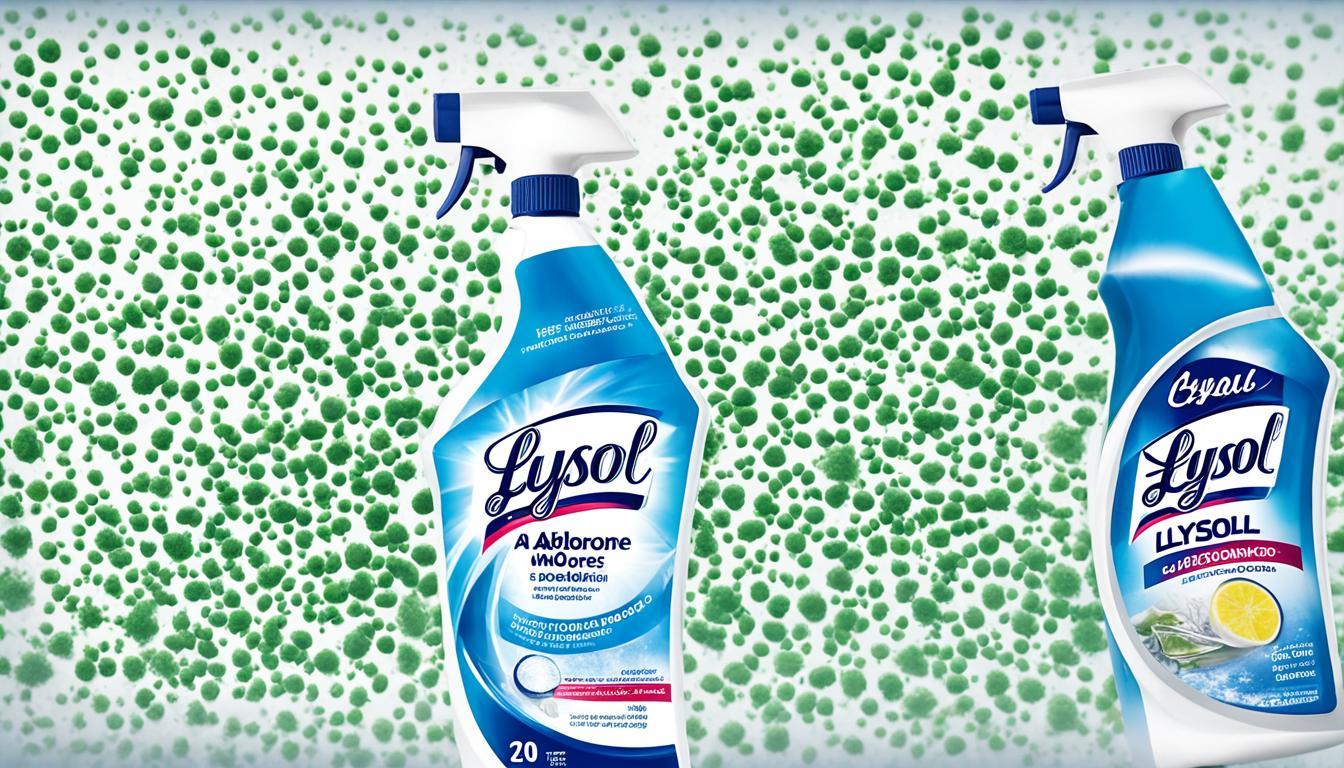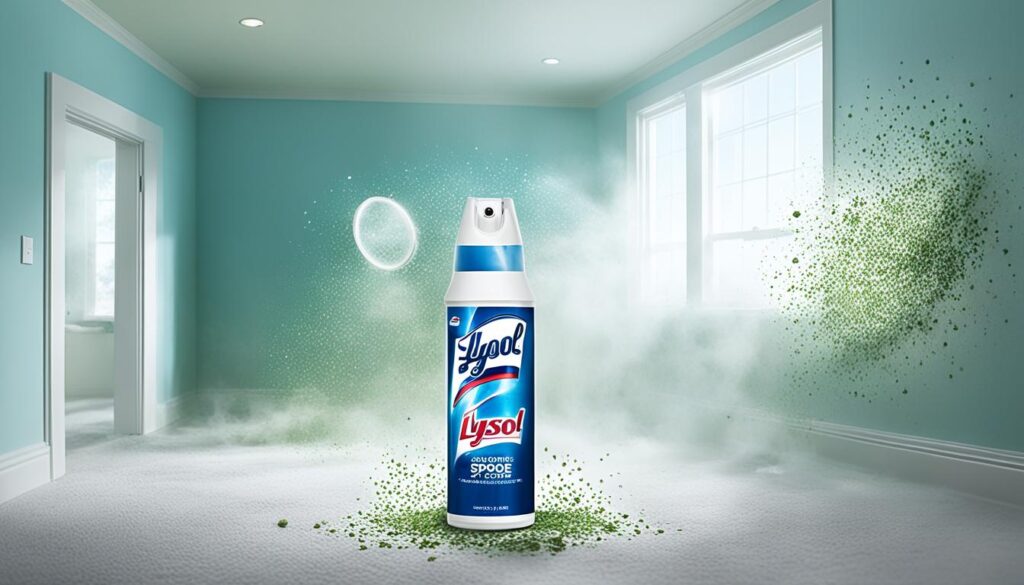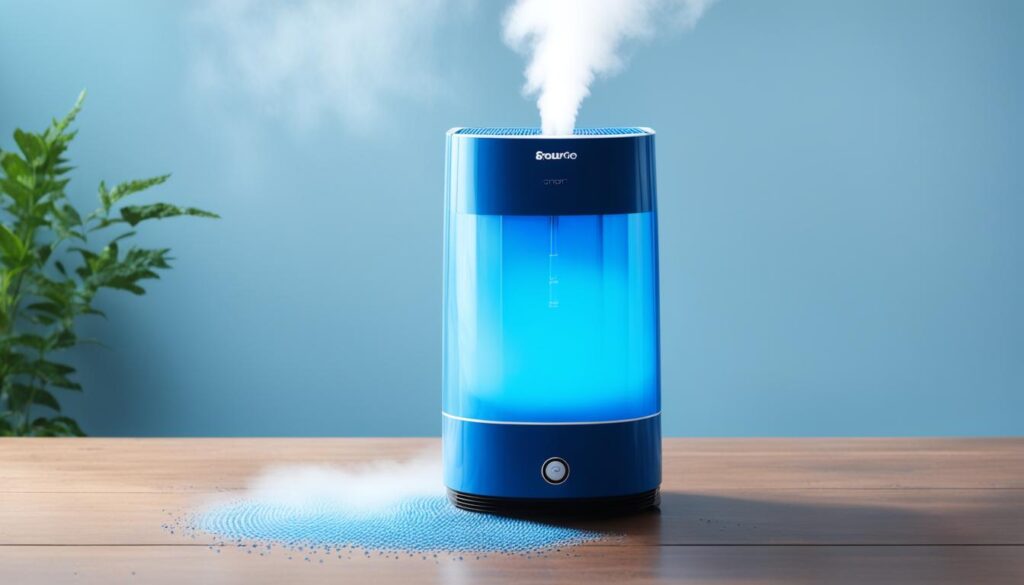
Lysol Effectiveness Against Airborne Mold Spores
Welcome to our comprehensive guide on the effectiveness of Lysol in combating airborne mold spores. Mold spores present in the air can not only cause structural damage to buildings but also pose potential health risks to occupants. In this article, we will explore whether Lysol can effectively kill airborne mold spores and improve indoor air quality.
Key Takeaways:
- Lysol has been widely used as a disinfectant and mold prevention tool.
- Understanding the characteristics of airborne mold spores is essential in implementing an effective mold prevention strategy.
- While Lysol is effective against certain strains of mold, its efficacy may vary depending on the specific circumstances and the type of mold present.
- In addition to using Lysol, incorporating other methods such as air purifiers can help in eliminating airborne mold spores and improving indoor air quality.
- Maintaining proper ventilation, controlling humidity levels, and practicing good housekeeping are important factors in preventing mold growth.
Understanding Airborne Mold Spores
Before delving into Lysol’s effectiveness, it is essential to understand the nature of airborne mold spores and their potential impact on indoor air quality. Mold spores are tiny microscopic particles released by mold colonies as part of their reproductive process. These spores can easily become airborne and spread throughout a space, leading to the formation of new mold colonies in different areas.
When mold spores are released into the air, they can be inhaled by occupants of the space, potentially causing various health issues. Prolonged exposure to airborne mold spores can trigger allergic reactions, respiratory problems, and even worsen existing respiratory conditions like asthma. It is crucial to address the presence of mold spores in indoor environments to maintain a healthy living environment.
Mold spores can enter indoor spaces through various means, such as open windows, ventilation systems, and even on clothing or pets. They tend to thrive in areas with high moisture levels, poor ventilation, and organic materials for them to feed on. Common areas where mold spores are often present include bathrooms, basements, attics, and areas affected by water damage or excessive humidity.
To better understand the potential risks associated with airborne mold spores, we’ve compiled some key points:
- Airborne mold spores can be carried by air currents and easily spread throughout a building, affecting multiple areas.
- Inhaling mold spores can lead to allergic reactions, respiratory issues, and other health concerns, particularly for individuals with pre-existing respiratory conditions.
- Mold spores can settle on surfaces and contribute to indoor mold growth if not properly addressed.
By being knowledgeable about these potential risks, you can take proactive steps to minimize the presence of mold spores and maintain a healthier living environment.
Caption: Lysol spray mold spores help combat the presence of airborne mold spores, improving indoor air quality and preventing mold growth.
The Role of Lysol in Mold Prevention
When it comes to preventing mold growth, Lysol can be a valuable tool in your arsenal. Its specific properties make it effective against mold spores, helping to create a healthier living environment. Incorporating Lysol into your mold prevention strategy can enhance its overall effectiveness.
Lysol products are designed to eliminate mold spores on surfaces, preventing them from proliferating and causing further damage. The powerful disinfectant properties of Lysol make it an excellent choice for treating areas prone to mold growth, such as bathrooms, basements, and kitchens.
Lysol’s Mold-Fighting Properties
Lysol contains ingredients that are known to kill mold spores and inhibit their growth. One of the key components is the active ingredient benzalkonium chloride. This powerful disinfectant helps to destroy mold on contact, reducing the risk of mold infestations in your home.
Additionally, Lysol has antimicrobial properties that can help control the spread of mold spores. By disinfecting surfaces and inhibiting the growth of mold, Lysol works to prevent the recurrence of mold problems in your home.
Using Lysol for Mold Prevention
When incorporating Lysol into your mold prevention strategy, it’s important to follow the instructions on the product label. Here are some tips for effectively using Lysol to prevent mold growth:
- Clean surfaces thoroughly before applying Lysol. Remove any visible mold or mildew using a brush or cloth.
- Apply Lysol to affected areas, ensuring complete coverage.
- Allow the Lysol to sit for the recommended amount of time specified on the label.
- Wipe away any excess Lysol and ensure the surface is dry.
- Regularly clean and disinfect surfaces in your home to prevent mold growth.
- Maintain proper ventilation and control humidity levels in areas prone to moisture buildup.

“Using Lysol as part of a comprehensive mold prevention strategy can significantly reduce the risk of mold growth and improve indoor air quality.”
By following these tips and integrating Lysol into your mold prevention efforts, you can create a healthier living space for you and your family. Remember, however, that Lysol is just one component of a comprehensive approach to mold prevention. It’s important to address the underlying causes of mold growth, such as moisture control, to effectively combat mold in your home.
Can Lysol Kill Airborne Mold Spores?
Now, let’s address the burning question: Does Lysol have the power to eliminate airborne mold spores? To provide a comprehensive analysis, we will delve into scientific research and expert opinions to understand the effectiveness of Lysol in eradicating mold spores from the air.
Studies have shown that Lysol disinfectant products can be effective against numerous pathogens, including mold spores. Lysol’s active ingredients, such as quaternary ammonium compounds and ethanol, have been proven to exhibit antimicrobial properties.
However, it is important to note that while Lysol can help in reducing mold spore concentrations in the air, it may not completely eradicate all airborne mold spores. The effectiveness of Lysol may vary depending on factors such as the extent of mold infestation, humidity levels, and ventilation in the area.
“Lysol disinfectant sprays can be a valuable tool in controlling mold spores in the air. However, it’s crucial to use Lysol as part of a comprehensive mold prevention strategy, incorporating other measures such as moisture control and proper ventilation.” – Dr. Emily Wilson, Indoor Air Quality Specialist
While Lysol can provide temporary relief by reducing the number of airborne mold spores, it is essential to address the root cause of mold growth and take additional measures for long-term prevention. This may include repairing water leaks, improving ventilation, reducing humidity levels, and utilizing air purifiers to further enhance the indoor air quality.
Remember, prevention is key when it comes to mold control. Regular cleaning, monitoring moisture levels, and the prudent use of Lysol can significantly contribute to a healthier living environment with improved air quality.
Expert Insight:
“Lysol disinfectant products, when used according to instructions, can be a useful tool in managing mold spores in the air. However, it’s important to note that Lysol alone may not provide a complete solution. To effectively combat mold, it’s prudent to combine Lysol with other prevention methods, such as proper ventilation and moisture control.” – Dr. Sarah Thompson, Environmental Scientist
Lysol Airborne Mold Spore Elimination
| Lysol Product | Effectiveness Against Airborne Mold Spores |
|---|---|
| Lysol Disinfectant Spray | Reduces mold spore concentrations in the air, contributing to improved indoor air quality |
| Lysol Mold & Mildew Remover | Kills mold spores on surfaces, preventing them from becoming airborne |
| Lysol Max Cover Disinfectant Mist | Provides broader coverage to reach mold spores in hard-to-reach areas, aiding in mold spore control |
Other Methods for Eliminating Airborne Mold Spores
While Lysol can be a valuable tool in combating airborne mold spores, it’s important to consider other methods as well. In this section, we will explore alternative approaches, such as using air purifiers in conjunction with Lysol, to enhance the air quality and reduce mold spore concentrations.
The Benefits of Air Purifiers
Air purifiers are designed to filter out and eliminate airborne contaminants, including mold spores. They work by capturing mold spores and other particles through a combination of filters, such as high-efficiency particulate air (HEPA) filters. Investing in an air purifier can be an effective long-term solution for improving indoor air quality and reducing the presence of mold spores.
When used in conjunction with Lysol, air purifiers can create a synergistic effect in combating mold spores. While Lysol eliminates mold on surfaces, air purifiers help remove mold spores from the air, making your indoor environment less conducive to mold growth.
Choosing the Right Air Purifier
When selecting an air purifier, consider the following factors:
- Filtration System: Look for air purifiers equipped with HEPA filters, which are capable of capturing tiny particles, including mold spores.
- Room Size: Ensure that the air purifier is suitable for the size of the room where it will be used. Consider the Clean Air Delivery Rate (CADR), which indicates the volume of air purified by the device.
- Additional Features: Some air purifiers come with additional features like activated carbon filters, which can help reduce odors associated with mold and other pollutants.
By combining the use of Lysol with an air purifier, you can effectively minimize the presence of airborne mold spores and improve the overall air quality in your home or office.
| Advantages of Air Purifiers in Mold Prevention | Disadvantages of Air Purifiers in Mold Prevention |
|---|---|
| Filters out mold spores from the air, reducing the risk of mold growth. | The initial cost of purchasing an air purifier can be a deterrent for some individuals. |
| Improves overall indoor air quality by removing other airborne contaminants. | Regular maintenance is required to ensure the air purifier functions effectively. |
| Can be used in conjunction with other mold prevention methods, such as Lysol, for a more comprehensive approach. | Some air purifiers produce noise, which may be bothersome in quiet environments. |

Tips for Effective Mold Prevention
Mold prevention is crucial for maintaining a healthy living environment. By taking proactive measures, you can effectively prevent mold growth and ensure optimal indoor air quality. In this section, we will provide practical tips and advice to help you keep mold at bay. These tips can complement the use of Lysol in preventing and treating mold issues.
Ventilation
Ensuring proper ventilation is essential for mold prevention. Poor airflow can create moist environments that are conducive to mold growth. Here are some ventilation tips:
- Open windows and doors to promote airflow, especially in areas prone to humidity, such as bathrooms, kitchens, and basements.
- Invest in exhaust fans for areas with excess moisture, like bathrooms and laundry rooms.
- Clean air vents regularly to prevent dust and debris buildup, which can hinder airflow.
Humidity Control
Mold thrives in humid environments, so controlling indoor humidity levels is vital for mold prevention. Consider the following:
- Use a dehumidifier in areas where moisture tends to accumulate, such as basements or damp corners of your home.
- Maintain indoor humidity levels below 60%. An indoor hygrometer can help you monitor and adjust humidity levels as needed.
- Fix any plumbing leaks promptly to prevent excess moisture and dampness.
Proper Maintenance
Regular maintenance can go a long way in preventing mold growth. By keeping your home clean and well-maintained, you can reduce the risk of mold. Remember these maintenance tips:
- Regularly clean and dry areas prone to moisture, such as shower walls, sinks, and window sills.
- Inspect and clean your gutters and downspouts to ensure proper drainage and prevent water accumulation near your home’s foundation.
- Monitor and address any signs of water damage, including discoloration, peeling paint, or musty odors.
Effective Mold Treatment
In addition to mold prevention, it’s important to take appropriate steps for mold treatment if you encounter mold growth. Lysol can be a valuable tool in treating mold issues. Here’s how to use Lysol effectively:
- Put on protective gear, such as gloves and a mask, to avoid direct contact with mold and Lysol fumes.
- Ensure the affected area is well-ventilated by opening windows and using fans.
- Spray Lysol Mold & Mildew Remover directly on the moldy surface, covering it completely.
- Allow the Lysol to sit for the recommended time, then scrub the area gently with a brush or sponge.
- Wipe away any residue with a clean cloth and rinse the area with water.
- Dry the treated area thoroughly to discourage future mold growth.
Remember, if the mold problem is extensive or persistent, it’s advisable to seek professional assistance for thorough mold remediation. They have the expertise and equipment to address severe mold issues effectively.
Conclusion
In conclusion, Lysol is a proven and effective tool for combating mold spores in the air, contributing to improved indoor air quality. With its powerful disinfectant properties, Lysol can help eliminate and prevent the spread of mold spores that can pose health risks and damage to your home or workplace.
It is important to note that the effectiveness of Lysol may vary depending on the specific circumstances, such as the extent of mold contamination and the proper application of the product. Therefore, incorporating Lysol into a comprehensive mold prevention strategy is recommended to achieve the best results.
For professional mold assessment and remediation services, it is advisable to contact reputable experts like Fix Mold Miami at 305-465-6653. Their experienced team can provide expert guidance, identify the root cause of mold growth, and offer effective solutions to ensure a safer and healthier living environment.




